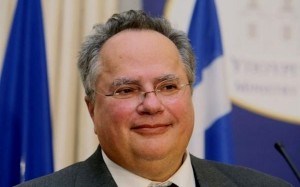 Foreign Minister Nikos Kotzias met in Brussels, on the margins of today’s meeting of the EU Foreign Affairs Council, with the Foreign Ministers of Cyprus and Lebanon, Ioannis Kasoulides and Gebran Bassil, respectively.
Foreign Minister Nikos Kotzias met in Brussels, on the margins of today’s meeting of the EU Foreign Affairs Council, with the Foreign Ministers of Cyprus and Lebanon, Ioannis Kasoulides and Gebran Bassil, respectively.
This first such trilateral meeting was dominated by issues of regional and international interest, while special emphasis was put on the refugee crisis, terrorism and the peace process in the wider Middle East.
The talks looked at the prospects for building trilateral cooperation in the economic and trade sectors, as well as in the sectors of energy, security and culture.
Finally, it was agreed for Messrs. Kotzias and Kasoulides to carry out a joint visit to Lebanon in the near future.
Tag: Greece
-
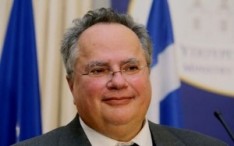
Foreign Minister Kotzias has trilateral meeting with the Foreign Ministers of Cyprus and Lebanon, Ioannis Kasoulides and Gebran Bassil
-
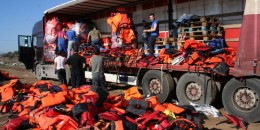
14,000 Discarded Refugee Lifejackets Traveling to Berlin for Art Project
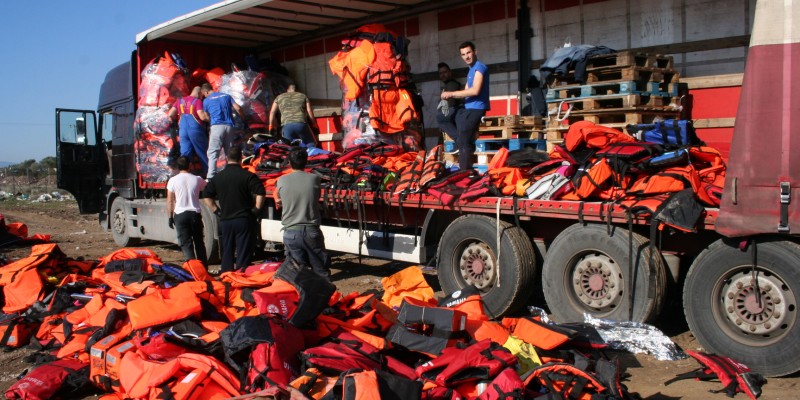 About 14,000 lifejackets used and discarded by refugees and migrants after their arrival on the coast of Lesvos travelled to Berlin on Tuesday so that they can be used by Chinese artist and activist Ai Weiwei for a new art project.
About 14,000 lifejackets used and discarded by refugees and migrants after their arrival on the coast of Lesvos travelled to Berlin on Tuesday so that they can be used by Chinese artist and activist Ai Weiwei for a new art project.The decision to give away the used lifejackets — bought by refugees in Turkey and most of them flimsy — was taken by the island’s mayor, Spyros Galinos, who told ANA-MPA that the aim is to create a work that “will affect and mobilize the entire international community regarding the crime that takes place every day in the Aegean by unscrupulous traffickers.”
He also said the island will have the “distinctive honor” of having a monument created by Weiwei in Lesvos, which will be dedicated to the refugees making the perilous journey towards Europe.
Municipal authorities have gathered hundreds of thousands of lifejackets during the past year from various landing areas around Lesvos.
-

Delphi to host top level Economic Forum
 The first annual Delphi Economic Forum will be held at the European Cultural Centre of Delphi (ECCD, February 25 – 28, 2016) under the auspices of the President of the Hellenic Republic, Prokopis Pavlopoulos. The aim of the conference is to engage business, political, academic and other influential opinion makers, in an effort to address emerging challenges for Greece and to contribute to a policy framework that will set the grounds for the country’s socio-economic transformation and revival.
The first annual Delphi Economic Forum will be held at the European Cultural Centre of Delphi (ECCD, February 25 – 28, 2016) under the auspices of the President of the Hellenic Republic, Prokopis Pavlopoulos. The aim of the conference is to engage business, political, academic and other influential opinion makers, in an effort to address emerging challenges for Greece and to contribute to a policy framework that will set the grounds for the country’s socio-economic transformation and revival.Among the issues to be discussed at the Conference, according to the 4-day program, are the shifts in the global balance of power, strategies for sustainable development, Greece’s constitutional revision dilemmas, Europe’s migration and refugee crisis, Foreign Direct Investment and entrepreneurship as key drivers for the Greek economy, energy issues, the Greek pension system and the demographics of ageing, media and education reforms, the cooperation with the Greek Diaspora, as well as extremism and populism as challenges for the future of Europe.
High-level government officials, influential politicians and major experts from Greece and abroad are expected to attend, as well as distinguished businessmen, market executive’s academics and journalists from the international and domestic community. The list of speakers includes Helene Ahrweiler, President of the Administration Council of ECCD, Ioannis Dragasakis, Deputy Prime Minister of Greece, George Katrougalos, Minister of Labor, Ioannis Amanatidis, Deputy Minister of Foreign Affairs, Kostas Bakoyannis, Governor of Central Greece Region, Dimitris Avramopoulos, European Commissioner for Migration, Corina Cretu, Regional Policy Commissioner, Declan Costello, Director of Economic Relations of the European Commission, Deborah Wince-Smith, President and CEO, US Council on Competitiveness, Lucas Papademos, former Greek Prime Minister, Thanos Dokos, Director General Hellenic Foundation for European and Foreign Policy, and many more.
Τhe Conference is taking place in Delphi, one of the most important archaeological sites of Greece, which seems to appear in the itinerary of every traveler who is attracted to the oracle that influenced affairs in the known world for over a thousand years.
-
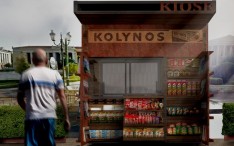
Designs for new kiosks chosen
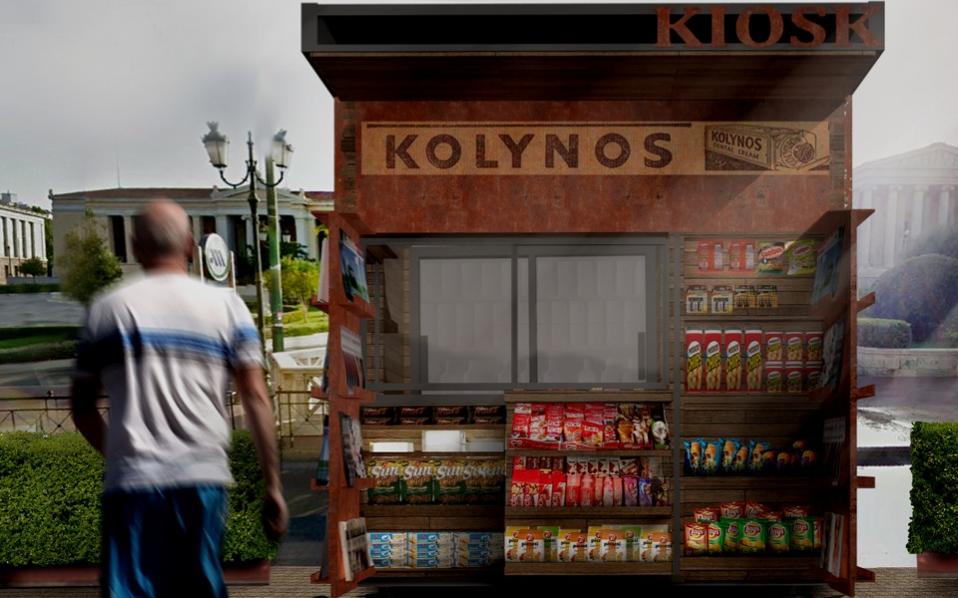 The Greek capital may see a new generation of kiosks after the City of Athens handed out awards Tuesday for three designs to replace the old street stands.
The Greek capital may see a new generation of kiosks after the City of Athens handed out awards Tuesday for three designs to replace the old street stands.The municipality has removed 214 defunct kiosks from the city’s sidewalks since 2012. It recently held a competition for architects to come up with a new design for the structures.
“The image of illegal extensions around today’s kiosks has to come to an end,” said Athens Mayor Giorgos Kaminis.
“Athens needs a new, pioneering, functional and good-looking kiosk to improve the urban landscape and the capital’s image,” he added.
The winning designs are expected to form the basis for any new kiosks erected in Athens. They are on display at the Technopolis cultural complex.
-
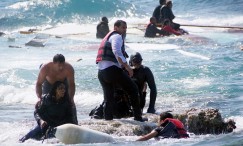
Greek islanders to be nominated for Nobel peace prize
 Greek islanders who have been on the frontline of the refugee crisis are to be nominated for the Nobel peace prize with the support of their national government.
Greek islanders who have been on the frontline of the refugee crisis are to be nominated for the Nobel peace prize with the support of their national government.Of the 900,000 refugees who entered Europe last year most were received –scared, soaked and travelling in rickety boats – by those who live on the Greek islands in the Aegean Sea.
The islanders, including fishermen who gave up their work to rescue people from the sea, are in line to be honoured with one of the world’s most esteemed awards. Eminent academics from the universities of Oxford, Princeton, Harvard, Cornell and Copenhagen are drafting a submission in favour of awarding the prize to the people of Lesbos, Kos, Chíos, Samos, Rhodes and Leros.
The nomination deadline is 1 February, but those behind the plan have already met the Greek minister for migration, Yiannis Mouzalas, who they say has offered his government’s full support. A petition on the website of the grassroots campaign group, Avaaz, in favour of the nomination has amassed 280,000 signatures. According to the petition: “On remote Greek islands, grandmothers have sung terrified little babies to sleep, while teachers, pensioners and students have spent months offering food, shelter, clothing and comfort to refugees who have risked their lives to flee war and terror.”
While the official nomination letter is yet to be finalised, it is understood the academics, whose identities will be revealed in the coming days, will implore the Nobel committee members to accept their nomination.
They will say that it must be noted that a people of a country already dealing with its own economic crisis responded to the unfolding tragedy of the refugee crisis with “empathy and self-sacrifice”, opening their homes to the dispossessed, risking their lives to save others and taking care of the sick and injured.
In December, the image of Antonis Deligiorgis, a 34-year-old Greek army sergeant, rescuing an Eritrean refugee from the turbulent waters off Rhodes, was singled out as a striking illustration of the valour of those in the islands.
Only individuals or organisations are eligible to win the prize so it is likely that the “solidarity networks” on the islands – groups of volunteers who organised to help the refugees – or individuals within groups will be the official nominees. A precedent was set in 1976 when Betty Williams and Mairead Corrigan won the prize for their efforts in seeking peace in Northern Ireland. It was seen as a reward for all those who sought reconciliation during the most troubled years.
The volunteer networks on the Greek islands have provided accommodation, hygiene packs, food, dry clothes and help with the next steps for refugees. However, it is claimed that the instincts of the majority of islanders set the tone across Europe towards the refugees’ plight.
Spyro Limneos, an activist in Greece for Avaaz who distributed aid on the islands, said: “The people involved in the solidarity networks organised and helped the desperate when the governments weren’t even willing to recognise that the there was a crisis.
“By opening their hearts the islanders sent a powerful message that humanity is above races, above nations.
“I will never forget seeing young girls being rescued from a boat on Leros. They were smiling. They didn’t have suitcases or any possessions except their end-of-year school certificates written in Arabic. They laid those down in the sun to dry out. It was a combination of tragedy and hope.”
One of the organisers of the Solidarity Networks, Matina Katsiveli, 61, a retired judge who lives on Leros, welcomed the move but said there was “reward enough in the smiles of the people we help”.
-

Greece Among Countries With Most Citizens Living Overseas
 OECD ranked its country members based on the number of people living overseas. Ireland came first, with the highest number of citizens living in countries overseas, even though the country is quickly recovering from the devastating impact of an economic crisis.
OECD ranked its country members based on the number of people living overseas. Ireland came first, with the highest number of citizens living in countries overseas, even though the country is quickly recovering from the devastating impact of an economic crisis.There are approximately 35,300 Irish migrants living overseas. These people fled the country between April 2014 and April 2015.
A graph published by Forbes shows the top ten countries in the list, including New Zealand, Portugal, Mexico, Luxembourg and Iceland.
Greece was ranked 11th, with 6.6% of the native-born population living abroad in 2014.
Countries with large populations, such as Brazil, Japan, the US and China are among the countries with the smaller number of native born people living overseas.
-
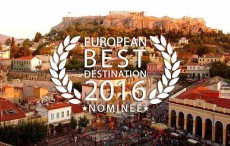
Vote Now! Athens in the Running for the Best European Destination 2016
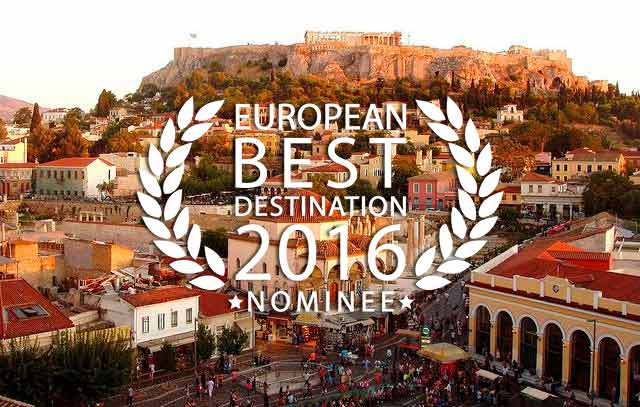 The European Best Destinations website has nominated Athens, Greece, as one of the 20 candidates in the running for the title of the Best European Destination in 2016.
The European Best Destinations website has nominated Athens, Greece, as one of the 20 candidates in the running for the title of the Best European Destination in 2016.The voting for this prestigious label, synonymous with European excellence, will take place online between January 20 and February 10. The winner will be the city with the most online votes!
The “Best European Destination 2016” will be authorized to use the title and affix the “European Best Destination” logo on all its communications, adverts, website and photos; it will also have the right to authorize its own public and private partners to use the logo.
According to organizer EBD, the election of the European Best destinations receives substantial coverage right across all the various media in Europe.
In 2015 the best destination in Europe was Bordeaux. Athens came in third place last year.
Cast your vote here!
In its seventh year, the online competition is an event organized by the European Best Destinations (EBD), a European organization based in Brussels and developed to promote culture and tourism in Europe. In partnership with the participating tourism offices and the EDEN Network the organization promotes a better understanding of the wealth, diversity and quality of European destinations and Europe as the number one destination in the world.
Since 2009 EBD has been working with major tourism offices in Europe to reward and highlight the most visited destinations via its website and social networks (+2,5 millions of visitors and thousands of followers on Facebook, Twitter, Google+ Pinterest and 26,000,000 of media coverage).
-

This is Athens!
 Birthplace of philosophy, democracy and drama, the city of Athens is not only an open-air museum of world-class cultural heritage attractions but also a contemporary metropolis with an urban personality. Named after the most benevolent Greek Goddess, Athena, the goddess of wisdom and inspiration, Athens has always been at the cultural fore.
Birthplace of philosophy, democracy and drama, the city of Athens is not only an open-air museum of world-class cultural heritage attractions but also a contemporary metropolis with an urban personality. Named after the most benevolent Greek Goddess, Athena, the goddess of wisdom and inspiration, Athens has always been at the cultural fore.With equal measures of grunge and grace, Athens merges the past with the present in the most slender way! A city of paradoxes and great contrasts, in the country that first invented the courtesy and generosity towards people who are far from their home, hospitality (xenia).
An intellectual beacon of the ancient world with spectacular Mediterranean landscapes bathed in the renowned light, Athens is a sophisticated cosmopolitan hub with delicious gastronomic delights, electrifying nightlife, creative vibes and a booming art scene.
From the iconic Acropolis, rising above the city, to charming up and coming neighborhoods and contemporary art galleries, the city of Classic Marathon and Olympic Games is a majestically quirky clash of past and present.
One of the world’s oldest cities with a recorded history of 3,500 years, the Greek capital is constantly undergoing urban renewals to keep up with the evolution of time. Athens lives up to all the hype!
-
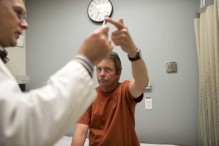
First MS treatment to bear Greek signature
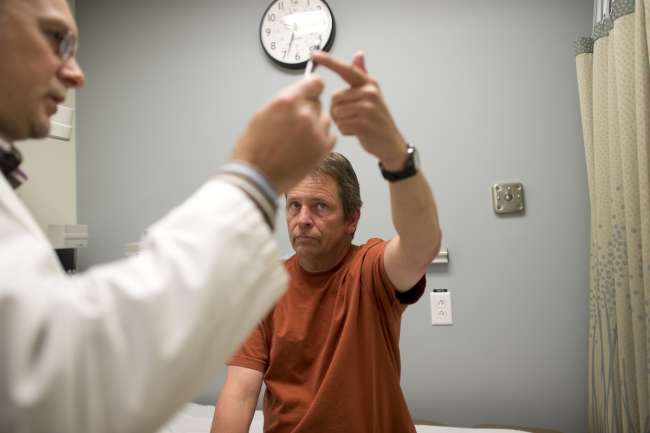 The release of the first Greek-patented therapy against multiple sclerosis (MS) is only a matter of time.
The release of the first Greek-patented therapy against multiple sclerosis (MS) is only a matter of time.A long-term and costly venture by a group of four medical researchers, in collaboration with the University of Patras and VIANEX SA, the largest Greek pharmaceutical company in Greece and founded by the Giannakopoulos family, seems to be bearing fruit.
Yiannis Matsoukas, professor of chemistry at the University of Patras, and his team obtained the first world patent for a ground-breaking therapeutic, which could treat hundreds of thousands of people suffering from MS.
MS is an autoimmune, demyelinating disease of the central nervous system, for which numerous treatment options have been made available to patients; however, these options need to be improved as they remained elusive and limited.
Dr Matsoukas, along with Maria Katsara, George Deraos and acclaimed Greek Australian researcher Vasso Apostolopoulos, have reviewed the current drugs and therapeutic approaches available to MS patients, pre-clinical trial interventions and recent animal model studies.
The team have confirmed the discovery of a ‘trigger’, as well as possible blockers, in order to develop a new MS treatment that will stop the disease from progressing.
“My collaboration with Professor Matsoukas has been ongoing since 1999,” Melbourne-based medical researcher Vasso Apostolopoulos tells Neos Kosmos.
“Dr Matsoukas was interested in working on MS by using the same method I developed for cancer vaccination; something I have been working on for over 20 years. So the chemists have created a formula based on it.”
Professor Apostolopoulos stresses that this new patent for MS is not a vaccine, but an immunotherapeutic method.
“Vaccines are meant to prevent disease. This method basically stops it from progressing,” she explains.
“All the evidence we’ve had so far in animal models and pre-clinical studies have shown that it intercepts Multiple Sclerosis.”
Meanwhile, the research, will move to Melbourne, under the guidance of Professor Apostolopoulos, where the formula is being modified to be made suitable for humans.
“The funding has been secured. We are finally reaching a point where we can recruit patients to get tested once we get approved by ethics and get all the paperwork out of the way,” the professor says.
“We are hoping to do so in approximately nine months, thanks to VIANEX.”
Dimitris Giannakopoulos, Vice President and deputy CEO of VIANEX SA has confirmed that the promising treatment will be made available to patients as soon as the human testing study is complete.
“We wouldn’t have progressed so far with our project if it wasn’t for the Giannakopoulos family’s support,” Apostolopoulos adds.
“The fact that this research started from Greece, that there’s a Greek company involved and innovative things are happening during these hard times for our country is of great importance.”
-
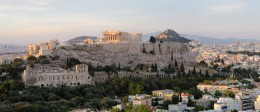
Greece among the 10 healthiest countries in the world
 You may strive to be healthy by eating well and exercising regularly, but what makes a person live to be 90? How can you increase your life expectancy and live a healthy, happy life? These are all things you can learn from the top 10 rated healthiest countries in the world, according to Samir Becic and his Health Fitness Revolution team. Becic and his team started by researching global data on life expectancy and health outcomes to narrow the list down to the top 10 performing countries including their projected life expectancy as of 2013.
You may strive to be healthy by eating well and exercising regularly, but what makes a person live to be 90? How can you increase your life expectancy and live a healthy, happy life? These are all things you can learn from the top 10 rated healthiest countries in the world, according to Samir Becic and his Health Fitness Revolution team. Becic and his team started by researching global data on life expectancy and health outcomes to narrow the list down to the top 10 performing countries including their projected life expectancy as of 2013.Read more here.